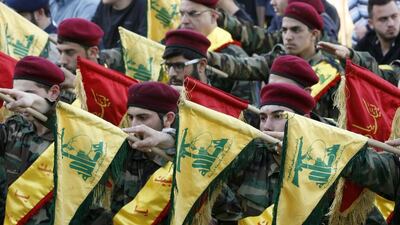In a move that marks further US escalation directed at the Iranian government and the Lebanese armed group Hizbollah, US Congress took first step on Wednesday in approving unanimously three resolutions that tighten the economic screws on Tehran and the Shiite militant party.
After almost six months of deliberations and amendments, the US House of Representatives passed a bundle of bills with measures designed to curb Iran’s ballistic missile programme and Hizbollah’s funding.
A unanimous majority of Democratic and Republican members of Congress voted orally in unison and passed the following resolutions: 1- H.R 359 - Urging the European Union to designate Hizbollah in its entirety as a terrorist organization; 2-H.R. 3342 - Sanctioning Hizbollah’s Illicit Use of Civilians as Defenseless Shields Act; 3-H.R. 3329 - Hizbollah International Financing Prevention Amendments Act of 2017 (HIFPA).
Members will vote on Resolution H.R. 1698 - Iran Ballistic Missiles and International Sanctions Enforcement Act- on Thursday.
Read more:
India defends ties with Iran and North Korea in talks with Tillerson
Trump tells Paris, Berlin to 'keep making money' via trade with Tehran
While the Ballistic missile sanctions, which clamp down on any outside support for Iran's programme, carry significance in terms of timing and efforts by the Trump administration to push for concessions from Tehran on the issue, the HIFPA bill represents biggest escalation against Hizbollah in terms of scope and reach of the proposed sanctions.
The HIFPA bill authorizes new sanctions against the Iran-funded group and its financial networks and requires the US president to release an annual estimate of the net worth of Hizbollah leaders and backers, including its secretary general Hassan Nasrallah.
The bill also targets Hizbollah affiliates including Bayt Al Mal, Jihad Al Bina, the Islamic Resistance Support Association, the Foreign Relations Department of Hizbollah, the External Security Organisation of Hizbollah, and its media outlets — Al Manar TV and Al Nour Radio.
Hanin Ghaddar, an expert on Hizbollah at the Washington Institute for Near East Policy, told The National that “official Lebanese visits to Washington in 2017 have somehow succeeded in protecting the Lebanese banks from these sanctions.
"But that doesn’t mean that Lebanon’s economy won’t be affected,” she added.
Joseph Bahout of The Carnegie Endowment for International Peace agrees. He said “Hizbollah itself has mastered new financial engineering to navigate through sanctions but the real impact will be felt on banking system in Lebanon.”
“If the Lebanese banks were to fully implement all the measures [requested under HIFPA] lots of foreign capital would flee the system,” Mr Bahout told The National.
Hizbollah leader Hassan Nasrallah bragged in the past that “all the banks of the world cannot stand as an obstacle to Hizbollah.”
He said: "As long as there is money in Iran, we will have money."
He has a point. Ms Ghaddar said "Hizbollah will not be directly affected as we all know how money comes from Iran -in bags- and sanctions won't stop this flow." Where this could hurt Hizbollah, however, she argued is "its backers' financial assets will have to be revealed, and its institutions will be sanctioned, this will create a serious gap and mistrust between Hizbollah and its community."
As a result many in business community "will try to distance themselves from Hizbollah for fears of sanctions" added Ms. Ghaddar.
Locally, Mr Bahout said HIFPA could complicate Hizbollah’s activities “like paying employees of their agencies [that are targeted] or doing business with organizations, commerce tied to them, and a whole range of minute day-to-day annoyances that could follow.”
Will Hizbollah retaliate? It depends. Ms Ghaddar said that last time a lighter version of HIFPA passed in 2015, “Blom bank in Verdun was blown up few months after”. A response would depend on how will the banks in Lebanon react or implement HIFPA, she argued.
For now, the bills will move to the Senate where another vote is expected before sending the new legislations to the President’s desk to sign into law. A process that’s expected to take another month.


